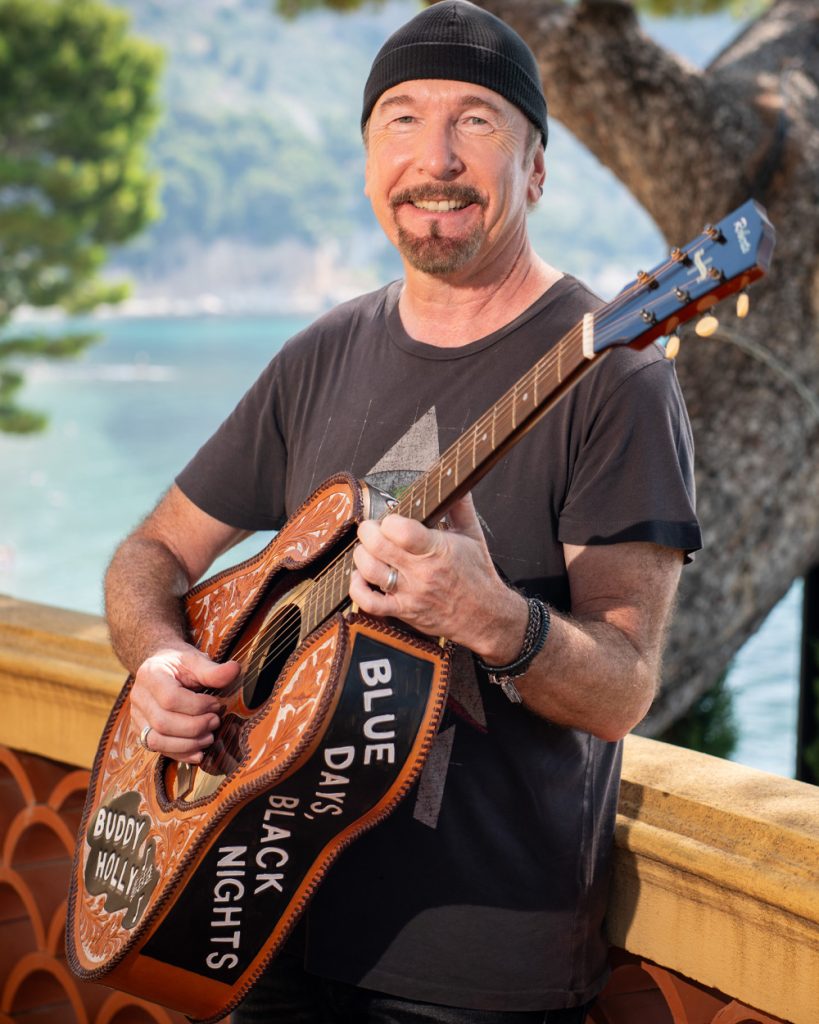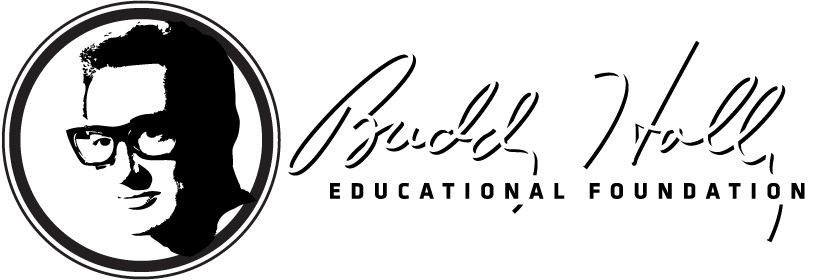- Phone : +(44) 123-456-7890
- Email : enquiries@tbhef.org
The Edge
From one guitar hero to another, the chain of music stretches ever onwards as pioneering guitar legend Duane Eddy’s personal Buddy ‘Holly Hop’ guitar crosses the Atlantic Ocean to reach the hands of U2’s The Edge, Ireland’s greatest living guitar hero, and one of the most inventively brilliant guitarists in rock history.

David Evans has been known as The Edge since he was a teenager in Dublin in the 1970s. He is a founding member of U2, a world-conquering rock group who have improbably retained the exact same line-up since their debut performance in a school gymnasium in 1976. The Crickets pioneered the essential four-piece band line-up and U2 have taken it to a whole other level of lifelong loyalty, commitment and spiritual, political and musical quest. In 48 years together, singer Bono, guitarist the Edge, bassist Adam Clayton and drummer Larry Mullen Jr have sold over 150 million albums, conducted record-breaking and technologically innovative stadium tours, won 22 Grammy Awards, and spearheaded world-changing campaigns for human rights and social justice. And they have done it whilst making some of the most ambitious, progressive and inventive rock music ever heard. You might wonder what the connection could be between an original 1950s rock and roll star and a guitarist born in 1961, two years after Buddy Holly’s untimely death? Celebrated for his pioneering use of effects to distort, expand and utterly transform the sounds of his guitars, the Edge is renowned as one of the most futuristic exponents of his instrument, a kind of guitar scientist. Indeed, the Edge built his first Flying V electric guitar with his older brother Dick Evans in their garden shed, following instructions from an electronic magazine. As U2 progressed, Edge’s use of a Memory Man delay pedal transformed their sound, allowing Edge to play simple notes, riffs and harmonics that built up into an astonishing wall of echoes. By the time of their emergence as post-punk heroes with debut album Boy in 1980, U2 already sounded like the future, and they have never stopped expanding and exploring. Nevertheless, Edge’s playing is aligned with the same principles as Buddy Holly’s: playing the instrument in service of songwriting.
Buddy was not a flashy player, and neither is the Edge. There is no shredding, none of the frantic excess of notes that became so prominent in rock guitar playing from the 1980s on. For Edge, as for Holly, it is always about the song, even though the guitar is central to framing those songs with beautifully clear lines and riffs that thread sections together. Simplicity, melody, imagination and rhythm: it is the guitar as a means to an end – and not just an end in itself. Duane Eddy would have understood this. A contemporary of Buddy’s, Eddy was really the first guitar hero of rock and roll. He was only 19 when he started scoring instrumental hits in 1957 showcasing his clean, resonant guitar sound and carefully articulated motifs. Eddy’s distinctive style focussed on touch, tone, melody and the spaces between notes. That his Buddy Holly guitar has been passed along by his widow Deed to another guitarist who understands the importance of space, restraint and atmosphere is a wonderful thing. When Edge first removed the guitar from its case, he immediately launched into playing U2’s classic 1988 single ‘Desire’. ‘There it is,’ Edge noted. ‘The Bo Diddley rhythm, just like “Not Fade Away”.’
Back in the earliest days of U2, when the teenage band went under the name The Hype, attempting to learn their chops playing ropey cover versions, they would sometimes launch into the Stranglers pub rock charger ‘Go Buddy Go’. It’s a rambunctious belter about a night on the tiles that traces an implicit line from rock’n’roll to punk. Talking to Edge about the influence of Holly on his playing (and, let’s face it, Buddy influenced every rock guitarist’s playing), we realised there was something more that connects them: a revolutionary spirit of change for the better. U2 were not a punk band, but their political idealism was shaped by that musical moment in time. As an original rock and roller, Holly played the most revolutionary music of his own times, working at the cutting edge by bringing black sounds and culture to white audiences to expand musical and social horizons. There is a continuity of that spirit in the dazzlingly modern sounds of U2. We’re still all rocking at the Holly Hop. Go Buddy Go. – Neil McCormick (Chief Music Critic for the Daily Telegraph)
Subscribe to our newsletter
The Buddy Holly Educational Foundation is a registered charity in the United States and the United Kingdom, with a mission to extend musical education to new generations regardless of income or ethnicity or learning levels.

- 1023 15th Street N.W. Suite 1100 Washington DC 20005
- enquiries@tbhef.org
Office Hours
- Mon – Tue : 09 AM - 09 PM
- Wed – Thu : 09 AM - 08 PM
- Fri – Sat : 09 AM - 07 PM
- Sunday : Closed
© The Buddy Holly Educational Foundation 2023
